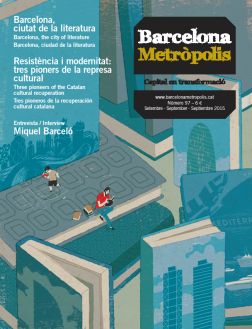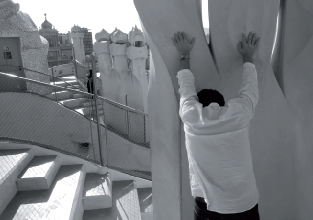When Russians regretfully invoke Barcelona’s gaudi [‘delight’ in Catalan], they aren’t making an error of pronunciation or talking of capricious buildings; rather, they are making a mistake that reveals a truth. They long for an easier city built on a human scale, with a mild climate, good food, friendly people, liberties that are both loathed and desired.

Photo: Katia Repina
The Red Square in Moscow, with historic department store GUM and St. Basil’s Cathedral in the background.
I say “from Barcelona” and then I clarify, “from just outside Barcelona”. I do it for effect: first I drop the evocative name of a city where in total, I now come to think, I’ve lived less time than in Russia, and then I correct myself. There, 150 kilometres is a stone’s throw away. Just as a beatific smile begins to spread across their face, I ruin all the charm with one word, village, which in Russian, I have been told, has connotations of chickens in the lanes, misery, alcoholism. I add “from a village just outside Barcelona”, and it seems like with three amplifications in a row, I’ve got closer to the truth. “You like music and verse”, they told me once, “you’re not from a village, you can’t fool us”. Provinces have a bad reputation in Russia, but that’s another story.
Barcelona, on the other hand, brings up the opposite connotations to the word village. Those who haven’t yet been there want to go. For the more emphatic, visiting Barcelona is their dream. Some of the welcomes I receive are so effusive that it makes me wonder whether they’re not just an exaggerated reaction to the foreigner, an enthusiastic courtesy. Then I must play the unfortunate role of realist: as a pseudo-native of Barcelona, allowing someone to have such high expectations of the city implies a terrible responsibility, and not lowering that promised Barcelona in time would make me party to the deception. But idealising costs nothing. I am more surprised by those who have visited and reply with the same fervour as those who have only seen the city in their imagination. Most came here in summer, and to do what? They went up to Park Güell at the hottest time of day, they piled into Barceloneta. They photographed the neo-Gothic façade of the cathedral and a skewed panorama of Montjuïc. One woman told me she’d spent just one day there, and that she’d only had time to see La Rambla and Plaça de Catalunya. And afterwards, she was in love with the city!
I couldn’t say for sure whether the mythical city of Barcelona has suffered from Russia’s recent forced, artificial distancing from Europe. As a place of liberties, along with Amsterdam, more than one dimwit has surely harped on about it being a depraved city. This is also a fantasy, but in the opposite sense. The unofficial propagandists would have us believe that they preserved a set of “traditional values” lost to (I’m embarrassed to use the word) “Gayrope”, the term they use to refer to Europe; “values” which are most certainly limited to hate; traditional, highly conventional values. The name, anyhow, is still quite suggestive and attractive, or at least euphonic, because I doubt that any other European city has lent its name to so many businesses: bars, of course, a chain of coffee shops in Saint Petersburg, a bridal wear shop in Nizhny Novgorod, a restaurant in Obninsk, a florist’s in Veliky Novgorod. And speaking of names, I like it when they take the name of the football club and, as the Italians do, audaciously use it as the city’s common diminutive. “How long did you live in Barça?” I like it because, for some reason, it reminds me of teenagers from the provinces who use the real, ugly diminutive, taking liberties that the city hasn’t given them and hiding a candid lack of self-confidence: “I’m going to study in Barna”. Of all the distorted names, however, I prefer that of Gaudí, which is top of the list of clichés, together with those of “is it hot in summer?”, “is there a lot of theft?”, “Messi” and “I’m against Catalan independence”. When you take away the acute accent, the illustrious surname becomes a learned word, gaudi [‘pleasure’, ‘delight’ in Catalan], that sounds odd but very funny.
Oh, and if the name Barcelona conjures up who knows what exotic visions for the Russians, for me, their badly accented Gaudi sums up its essence: a city where you can enjoy a clearer, more direct and evenly distributed type of pleasure. Like walking, for example. Interminable and inhospitable, the streets there have no pavements, and lined with identical houses on either side, the winter sees them covered in ice and the spring, in mud. You’re always looking down: holes, puddles, ice, broken paving stones. The scale changes and space expands. It’s not that everything in Barcelona is just around the corner; it’s that getting about on foot is a pleasure. “The weather” is something they don’t fail to mention when they begin one of those eulogistic duels. Nothing to say about the weather. Then comes “the food”: I was going to praise Russia’s festive food (homemade conserves, wild mushrooms, salads, salted cucumbers, vodka straight out the freezer), but it really isn’t everyday fare. What’s more, some of their most famous dairy products (tvorog, riajenka), are no real match for the variety of Mediterranean products, the wines, cheese, coffee, terraces. The abundance of bars and restaurants, that’s what they forget to praise about Barcelona! Perhaps because when they were there they went into the first city-centre establishment without looking around, spent a tidy sum and left contented, because in Moscow they would have paid the same for something not as good.
Later on, we get onto the subject of relationships and community, “everyone smiles”, and here I get my revenge: I insinuate the abysmal hypocrisy that hides behind Southern smiles. If we’re looking for a clash of cultures, it is to be found here more than anywhere else. Have you ever uttered the word “Russian” in front of a hotel worker or a hostess? The Greeks pull the same face when they hear the word “almogavar”. When I come back and notice how people are nice to me on the street, I feel like I’m in a utopia of politeness but, despite this, I somewhat miss that rude immediacy, that bitter sincerity among strangers. Like Gulliver when he comes back whinnying from his last journey, I arrive feeling brusque and mistrustful, looking strangers in the eye and forgetting to greet people.
Living in Russia is, above all, uncomfortable. You have to accept that fact, and some people are proud of it: they say it comes from an old patience and scorn of middleclass comforts, well-being and vanity. There, the pleasures are of the soul: extreme, welcoming people, endless conversations, music, poems learnt by heart, eyes you see on the street, the language, so beautiful and impossible, together with its faithful literature… But the body also has its needs, and it rebels. That’s why when Russians regretfully invoke Barcelona’s gaudi, they aren’t making an error of pronunciation or talking of capricious buildings (after all, Russia’s major cities are also home to art nouveau mansions); rather, they are making a mistake that reveals a truth. They long for an easier city built on a human scale, with a mild climate, good food, friendly people, liberties that are both loathed and desired; they long for balance, a city where the pleasures of the flesh come in small doses rather than all at once. We don’t play the piano as well, nor do we know Nabí by heart, and we drown our sorrows on the bar terrace down on the corner. I can see myself there now. And if the first response, “from Barcelona”, were correct in retrospect? From far off, from the grey northern winters to the arid plains of Lleida, I sometimes feel that oh-so-Russian longing for the dreamed-of city which one-day tours cannot satisfy. And to think that when I lived and studied here Barcelona didn’t appeal to me, quite the opposite . In that sense, too, I must have become Russified.





